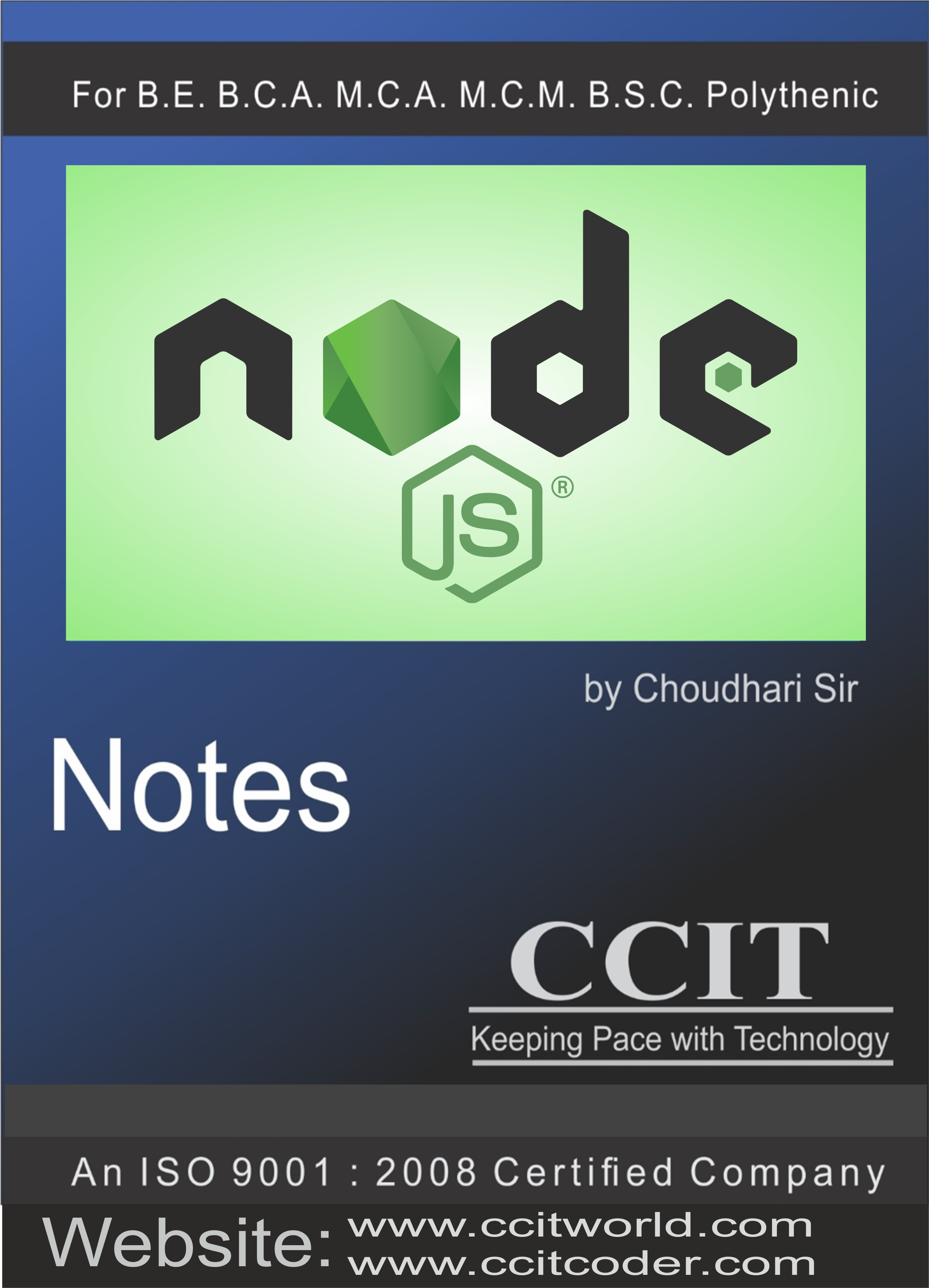
The Node.js course aims to empower learners with skills in server-side JavaScript. Covering event-driven architecture, asynchronous programming, and building scalable network applications, it prepares you for efficient and modern backend development.

- What is Node.js
- Features of Node.js
- Advantages of Node JS
- Traditional Web Server Model
- Node.js Process Model
- Visual Studio Code
- Sublime Text
- Brackets
- Read Eval Print Loop
- REPL commands
- Command line interfaces
- What is a module?
- Core Modules
- Local Modules
- Modules Types
- Importing Modules
- Modules Exports
- What is NPM ?
- Installing Packages Locally
- Adding dependency in package json
- Installing package globally
- Updating packages
- Package.json
- Introduction fs module
- Synchronous file Read operations
- Synchronous file Write operations
- Synchronous vs Asynchronous
- Asynchronous file Read operations
- Asynchronous file Write operations
- Creating Web Server
- Request Listener
- Handling http requests
- Sending Requests
- Server Response
- Indroduction Template
- Template Variables
- Template rendering
- Template Page
- Template Literals
- Uniform Resource Locator
- URL Structure
- Mapping request
- URL module
- Create URL
- URL Search Params
- What is Express.js
- why ExpressJS than nodejs
- Advantages of Express.js
- How Express.js Works
- Definition Middleware
- Execution Order
- Middleware Stack
- Built-in Middleware
- Custom Middleware
- Introduction Express module
- Require Express
- Create Express Application
- Express application method
- Create a Route
- Start the Server
- Run Your Application
- Request Object Properties
- HTTP Methods
- URL Information
- Request Lifecycle
- Sending response
- Sends a JSON response
- Renders a view template
- HTTP Methods
- Redirects the client to a different URL
- Response header
- Content-Type header
- Send file as the response
- Ends response process.
- Template Engines
- Setting up a Template Engine
- Views Folder
- Rendering Views
- Passing Data to Views
- Installation EJS
- Setting Up EJS in Express
- File Extension EJS
- Rendering EJS Views
- Embedding JavaScript
- Output Escaping
- Control Flow
- Loops
- include
- Passing Data to Views
- Installation Pug
- Setting Up pug in Express
- File Extension
- Rendering pug Views
- Pug Syntax
- Pug dynamic content
- Pug conditional statement
- Case statement
- pug Iteration statements
- include
- Template inheritance
- Set up serving static files
- Directory Structure
- URL Mapping Static Files
- Multiple Directories
- Path Prefix
- Modular Routing
- Create instance of the router
- Route Handling
- Mount Router
- Route Parameters
- Chaining Routes
- Nesting Routers
- Define Query String
- Accessing Query Strings
- Handling Multiple Values
- Default Values
- URL Encoding
- Generating URLs with Query Strings
- Parses POST data
- Parsing data JSON and URL-encoded
- JSON Parsing
- URL-encoded Parsing
- Limiting Payload Size
- Multer Package
- Installation Multer
- Require Multer
- Setup Multer Middleware
- Express Route with Multer Middleware
- Single File Upload
- Multiple File Upload
- File Storage Configuration
- Installation MySQL Module
- Configure the MySQL connection
- Executing Queries
- Insert Queries
- Update Queries
- Select Queries
- Delete Queries
- Parameterized Queries
- Closing the Connection
- Introduction MVC
- Project Structure
- Database Connection
- Configure Connection
- Create models
- Controllers handle
- Routes map HTTP
- Views templating engine
- App Entry Point
- Introduction Mongoose
- Install Mongoose
- Connection to MongoDB
- Schemas MongoDB documents
- Model Creation
- CRUD operations
- Leverage Mongoose middleware
- Mongoose Populate
- Mongoose validators
- Closing Connection
- Introduction Session
- Middleware Session
- Installation Session
- Configure express-session
- Session Storage Options
- Session Properties
- Session ID
- Session Expiry
- Session Destruction
- Introduction Cookies
- Middleware Cookies
- Installation cookie-parser
- Setting Cookies
- Reading Cookies
- Clearing Cookies
- Secure Cookies
- Signed Cookies
- Introduction passport
- Install passport
- Require Dependencies
- Configure Passport
- Set Up Routes
- Protect Routes
- Initialize Passport in App
- google Authentication
- Facebook Authentication
- Database Management project
- Ecommerce Website Project
- Social media Website Project
CCIT's Node.js Notebook provides concise, hands-on guidance for mastering Node.js. Covering event-driven architecture, asynchronous programming, and building scalable applications, it's an essential resource for learners and professionals in backend JavaScript development.
- Theory Notes
- Course Book
- PPT Notes

Elevate your career prospects with CCIT's NodeJS Certificate, recognized by leading companies. As an ISO-certified institution, our certificate features QR code verification, ensuring authenticity and opening doors to top-tier opportunities in the industry.

